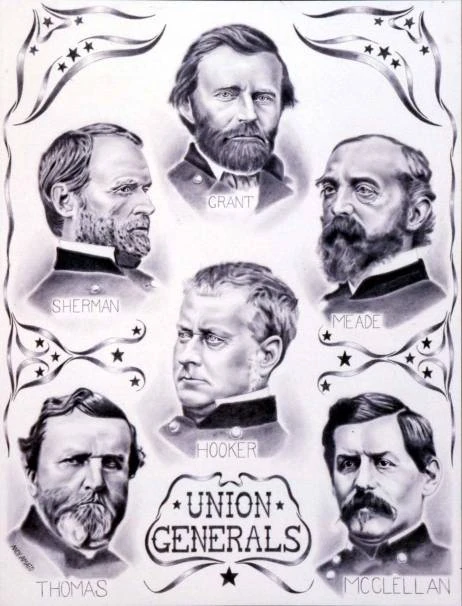
http://warrensburg.k12.mo.us/iadventure/4320spring10/aking/3d.html
Union Generals
There were many Generals during the Civil War. One of the first was Major Robert Anderson, he was the Union commander of Fort Sumter. (p. 502)
General Irvin McDowell was the Union leader for the First Battle of Bull Run. He wanted more time to get his men ready, but he had to fight before they were fully trained. His troops lost the battle at Bull Run, fleeing because they were scared and not ready. (p. 516)
General George McClellan replace General McDowell after McDowell lost the Battle of Bull Run. (p. 519). He was very careful, and Lincoln did not like that General McClellan didn’t want to attack with his men. At first his soldiers were winning the battle at Richmond, but then he waited so long to finish the battle, that the Confederate Army was able to recover and win Richmond. (p. 519)
General McClellan was also the Union leader in the Battle at Antietam Creek, Maryland, on September 17, 1862 (p. 520). This was a bloody battle, and neither side felt like they had won.
General Ulysses S. Grant was the General who helped capture Fort Henry on the Tennessee River, and Fort Donelson on the Cumberland River. Capturing these Forts was important to the North, so they could get control of the rivers. General Grant was also the leader for the North during the Battle of Shiloh, where the Grant forced the South out of an important railroad center (p. 521).
General David Farragut was the Union commander on April 26, 1862 when the Union captured New Orleans, Louisiana. (p. 521).
General Ambrose Burnside was the replacement for McClellan. He was the General in December 1862 who decided to march toward Richmond, Virginia. He lost many men in the Battle of Fredericksburg, and Lincoln replaced him. (p. 533).
Lincoln then put a new General in charge, General Joseph Hooker, also called “Fighting Joe”. The Union Army was defeated at the Battle of Chancellorsville in May 1863 even though “Fighting Joe” was telling everyone that he would win and defeat General Lee. (p. 533).
General George Meade was the Union General during the Battle of Gettysburg, June 1863. The North won this battle. (p 534.)
Lincoln gave General Ulysses S. Grant command of all Union Forces in 1864. (p. 535).
General William Tecumseh Sherman lead the Union Army toward Atlanta in June 1864. They captured Atlanta on September 2, 1864. Sherman is the General who ordered the burning of the city of Atlanta.
General Grant was the Union General who offered the surrender terms to the Confederate Army at Appomattox on April 9, 1865.